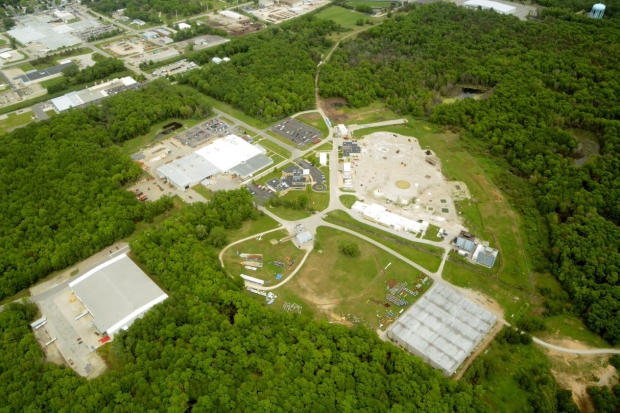DNR Says Tyco Failing To Comply With Marinette PFAS Investigation
Johnson Controls subsidiary was already sued by state related to contamination. Company alleges pollution could come from other sources.

An aerial view of Tyco’s Fire Training Center in Marinette. The DNR has said it has data showing that wastewater containing PFAS came from the training center. The chemicals are known to build up in biosolids generated by treatment plants, which were then spread on farm fields. Photo courtesy of Johnson Controls International
State regulators said a Marinette manufacturer of firefighting foam has repeatedly refused to comply with an investigation of PFAS contamination stemming from sewage sludge spread on farm fields in the region.
The Wisconsin Department of Natural Resources issued its third notice of non-compliance to Tyco Fire Products on Monday for delaying investigation of PFAS pollution near fields that had received biosolids, or treated sewage sludge, from the city of Marinette’s wastewater treatment plant. Tyco previously discharged firefighting foam that contained PFAS to the city’s sewer system, and data from 2017 and 2018 showed the sewage sludge contained significant levels of the harmful forever chemicals.
Tyco Fire Products and Johnson Controls International began sampling private wells near 61 farm fields in 2020 after first disputing regulators’ demands to test for the chemicals. Results showed 30 of 191 wells had PFAS levels exceeding the state’s recommended groundwater standard.
Tyco said in a February letter to the DNR that the company obtained public records that it claims show the agency allowed spreading of biosolids in Marinette and Oconto counties from known sources of PFAS.
“The documents bring to light facts about the WDNR’s biosolids program that, together with other concerns detailed below, necessitate a pause in the research being undertaken by Tyco in the biosolids area,” wrote Denice Nelson, Tyco’s senior director of remediation and strategy. “Specifically, the documents make clear that WDNR has allowed biosolids application to continue from industrial and municipal sources commonly known to be sources of or impacted by PFAS.”
Tyco said it appears the DNR hasn’t required testing for PFAS or enforced a limit in waste materials from those sources, including paper manufacturers. In an April 10 letter to Tyco, the DNR said indicating other potential sources for PFAS contamination is not a reason for the company to delay its field investigation when Tyco has been named as a responsible party for discharges of the chemicals.
“Further, at this time, the DNR has not received information to suggest that other biosolids landspread in Marinette County, and specifically at or near the Site, contain PFAS levels that may cause adverse environmental impacts,” wrote Alyssa Sellwood, the site’s project manager for the DNR.
The agency added that it’s developed an interim strategy for land spreading of biosolids containing PFAS. As part of that, the DNR said it’s encouraging permitted facilities to test for PFAS and consider their recommendations as the Environmental Protection Agency completes a risk assessment. The agency said it may pursue other parties responsible for contamination if other sources are identified. Sellwood said delaying the investigation would leave unanswered questions about who is at risk, as well as postpone response to limit contamination.
Tyco has spent millions to help the city of Marinette dispose of biosolids and update its sewer lines running to the city’s wastewater treatment plant.
Tyco’s investigation of PFAS dates back to 2017
Perfluoroalkyl and polyfluoroalkyl substances, commonly referred to as PFAS, represent a class of thousands of chemicals that have raised concerns because they’ve been linked to harmful health issues, including kidney and testicular cancers. The chemicals are found in firefighting foam and products like non-stick cookware. They don’t break down easily in the environment.
Tyco has tested firefighting foam at its Marinette facility since the 1960s. Peshtigo residents first learned of PFAS pollution in 2017 when Tyco began investigating contamination with the Department of Natural Resources. The DNR later referred Tyco and Johnson Controls to the Wisconsin Department of Justice for failure to report any release of PFAS when the chemicals were first discovered in 2013 at levels as high as 254,000 parts per trillion in groundwater. Company officials maintain they believed contamination was confined to its site.
In 2021, Peshtigo residents reached a $17.5 million settlement with Tyco and other companies over exposure to PFAS in private drinking water wells, property damage, and individual disease claims.
In March last year, Wisconsin Attorney General Josh Kaul filed a lawsuit against Tyco and Johnson Controls for violating the state’s hazardous spills law, saying the company hasn’t done enough to clean up PFAS contamination. A trial has been tentatively set for December of next year.
In September, Tyco and its parent company Johnson Controls began operation of a groundwater extraction and treatment system that they claim will treat 95 percent of PFAS in the area. The DNR has said it will remove, but not completely eliminate, the chemicals from groundwater.
More recently, Tyco has installed five deep wells for homeowners, according to a spokesperson for Johnson Controls. The company said testing shows three wells had no trace of PFAS and treatment systems successfully treated other contaminants like radium. Monitoring wells will be installed and tracked over time under DNR supervision to ensure safe water from the deep aquifer. Kathleen Cantillon with Johnson Controls said 45 out of 101 property owners have signed agreements to install deep wells.
In Wisconsin, PFAS have been detected in dozens of communities from small towns like Peshtigo and Campbell to larger cities like Eau Claire, Wausau and Madison.
State regulators say Tyco is failing to comply with investigation of PFAS near farm fields was originally published by Wisconsin Public Radio.
More about the PFAS Problem
- PFAS Levels in Great Lakes Fish Are Dropping - Danielle Kaeding - Feb 6th, 2026
- Gov. Evers and GOP Lawmakers Near a Deal on PFAS Pollution - Danielle Kaeding - Jan 22nd, 2026
- Gov. Evers Optimistic About Reaching Final Deal With Republican Lawmakers to Secure Release of $125 Million in Long-Awaited Pfas Investments - Gov. Tony Evers - Jan 21st, 2026
- Bipartisan Push to Tell Counties Faster When Water Tests Fail - Henry Redman - Dec 19th, 2025
- MKE County: County Seeks to Sue PFAS Producers, Oil Companies - Graham Kilmer - Dec 10th, 2025
- Wisconsin Reviewing EPA-Approved Pesticides For PFAS - Danielle Kaeding - Dec 9th, 2025
- State Nears Settlement with Johnson Controls/Tyco Over PFAS Spills - Danielle Kaeding - Dec 4th, 2025
- Senate Bill Promotes Soybean-Based Firefighting Foam to Replace PFAS - Danielle Kaeding - Dec 2nd, 2025
- Test Results Show High PFAS Levels in Wisconsin’s Landfill Runoff - Danielle Kaeding - Dec 2nd, 2025
- Wisconsin Communities Get $282 Million for Drinking Water Projects - Danielle Kaeding - Nov 19th, 2025
Read more about PFAS Problem here





















